Contributed by Barb Erickson
Barb’s journey as a surviving spouse is a testament to the complexities of grief—a process that reshapes the very essence of her being, forcing her to confront the realities of love lost too soon.
In the quiet suburban corners of Billings, Montana, Barb, a grieving widow, navigates the silence that has blanketed her home since November 23, 2020.
The absence of her husband, Mike, reverberates through each room, a constant reminder of the life they shared and the future they planned.
Their Love Story
Barb and Mike’s love story began unexpectedly in Billings at a mutual friend’s birthday party in 2007.
Despite the festive atmosphere, Barb was oblivious to Mike’s interest until he approached her, his declaration as straightforward as it was sincere: “Hi, I’m interested.”
Her puzzled “In what?” was met with a confident “In you,” setting the foundation for a relationship built on directness and depth. This encounter, emblematic of their entire relationship, was the start of a connection that felt decades deep, despite its infancy.
Theirs was a love rekindled from the ashes of past relationships, both having navigated the tumultuous waters of marriage and divorce, each believing that a serious relationship, let alone remarriage, was not in their cards.
Yet, life had a different plan.
Mike, from Billings, and Barb, who lived in Missoula, gravitated toward each other, their bond deepening with every shared interest and mutual respect.
Mike’s draw to Barb was as much about her independence and confidence as it was about her love for karaoke and football—passions that filled their time together with joy and companionship.

Despite the strength of their bond and the depth of their connection, Barb and Mike’s journey together wasn’t without its trials. Three and a half years into their relationship, Mike made the difficult decision to end things.
This period of separation, marked by confusion, guilt, and heartache, would later reveal itself to be a critical moment of growth and reflection for both.
The Breakup and Reflection
The breakup, unexpected as it was, forced Barb into a period of introspection. Meanwhile, Mike grappled with his own insecurities, particularly regarding his financial stability compared to Barb’s.
His decision to end their relationship stemmed from a deep-seated fear of not being “enough” for her.
During their time apart, Mike moved in with someone else, a decision that left Barb grappling with a mix of emotions, from sorrow to unresolved love.
It was in this state of separation that Barb learned the true reason behind their breakup: Mike’s anxiety over their disparate financial situations and his own health concerns, exacerbated by his history of heart disease.
This revelation shed new light on Mike’s actions, framing his decision as one not of rejection, but of vulnerability and fear.
Rekindling Their Love
The turning point came when Barb discovered that Mike’s subsequent relationship had ended. Compelled by her enduring feelings, she reached out with a simple yet profound message:
I still miss you.
This act of vulnerability was the catalyst for their reunion. They went on a date a week later, a meeting that felt less like a new beginning and more like a homecoming.
Their decision to move in together six months after reuniting marked a new chapter in their relationship, one built on a foundation of deeper understanding and mutual support.
Mike’s earlier insecurities were met with Barb’s unwavering assurance and acceptance, solidifying their commitment to each other.
Making It Legal

The decision to marry in 2020 was pragmatic—driven by a need for health insurance—but was imbued with all the romance and significance of their unique bond.
Barb’s declaration of love “to infinity and beyond” and Mike’s playful skepticism were emblematic of their relationship: a blend of profound love and light-hearted banter.
Their vows, especially Barb’s surprise addition of their signature phrase, captured the essence of their journey: a love that defied odds, enriched by both the joyous and challenging moments they shared.
Communication and Connection
Despite their strong connection, their work schedules—Barb’s days and Mike’s nights—could have been a wedge between them. Instead, they found a unique way to bridge the gap: a shared journal.
This journal became a vessel for their thoughts, dreams, and mundane details of daily life, from Barb’s reassuring words during lonely evenings to Mike’s playful banter about chores and groceries.
All laundry washed, dried, and put away. And hung up. I hung it all up as you slept with the light on.
I love what the new bed seems to be doing for your sleep.
Mike
It was here that Mike expressed his unwavering love and admiration for Barb, seeing in their daily exchanges a reflection of their commitment to each other.
I love you! I kinda like this late night/early morning exchanges. So often, (daily) I get to take a moment and think of you/us.
Mike
The journal entries not only facilitated communication during their opposite shifts but also served as a tangible reminder of their support for each other through life’s challenges, including Mike’s health scares.
Barb’s steadfast presence at his cardio appointments, despite his hatred for all things cardiac, underscored their partnership’s strength.
I’ve missed you all week! Thank you for going to my cardio appointment! I HATE my cardio stuff! Just makes me ill thinking about it! This ‘device’ on my chest bugs the shit out of me!
I just feel ‘lame’ and I don’t like it. I know you love me, but I sometimes wonder how much you can take of my cardio crap. It just scares the crap out of me.
Mike
The Night Mike Died, and Barb Became a Surviving Spouse
Barb’s recounting of the night Mike died is heart-wrenching. A sudden crash shattered the normalcy of their lives and their evening routine.
Barb raced downstairs, only to find Mike gasping for air and wedged between the wall and the door. She could not reach him to help and had to wait for the paramedics to arrive.
The journal, once a source of shared dreams and daily exchanges, turned into a one-sided conversation as Barb poured her grief into letters to Mike.
Through these letters, she articulates the depth of her loss, the loneliness that envelops her, and the love for Mike that endures beyond death.
Six days since I heard you take your last breath on Monday, November 23, 2020.
I tried so hard to open the door of the bathroom where you had collapsed, but I wasn’t strong enough.
The paramedics tried so hard to bring you back to me.
Barb, an excerpt from her grief journal
The Immediate Grief of a Surviving Spouse
In the raw aftermath of losing Mike, Barb’s world turned into a landscape of grief, a testament to the enduring pain a surviving spouse endures.
“It’s like half of me vanished,” she confides, encapsulating a sentiment many widows and widowers intimately understand.
It has been one week since that awful, horrible night that you left this world.
How can time go so fast and slow at the same time?
Barb, an excerpt from her grief journal
The silence in their home became deafening, a stark reminder of conversations and laughter now absent.
This immediate grief is a harrowing journey through memories and lost futures, each moment a stark reminder of the deep void left behind.
“Every morning, I wake up to the crushing reality that Mike isn’t here,” Barb reveals, her words painting a vivid picture of the solitude and longing that defines early widowhood.
It’s a profound loss, not just of the person but of the life they envisioned together.
For Barb, as for many grieving spouses, the challenge is in learning to cope and navigate a world that feels less colorful and less vibrant than the one they shared with their beloved.
This grief is not just mourning the person they lost but grappling with a reshaped existence, one that can feel overwhelming and incomplete.
We cleaned out the closets. I want the kids to go through things that they want to keep.
I worried that I was rushing them, but for me, you aren’t in stuff; you are in my heart. I don’t want to do all this alone. It would be too heartbreaking.
Barb, an excerpt from her grief journal
Navigating Grief: Beyond Traditional Stages
Unfortunately, when one’s husband dies, most widows can not simply grieve their loss. They must worry about finances: things like bills, life insurance, and social security benefits.
This layer of concern adds a complex dimension to the grieving process, intertwining the emotional turmoil with practical worries about the future.
In fact, Barb continues to write about these things to Mike as if they were still communicating via their shared journal, a poignant blend of the practical and the profoundly personal.
- “Jane has gone through all our expenses so we can figure out how to make it on my paycheck.”
- “I faxed one to iState so we could settle your life insurance.”
- “I received your two life insurance checks and deposited them into savings. I gave Amber and Tyler each a check for $1000.”
- “I filled out a loan application today to refinance the house. Based on a phone meeting with a loan officer, I could pay around $120 less a month on the house payment.”
These reflections not only underscore the financial realities facing many surviving spouses but also highlight Barb’s resilience and determination to navigate these challenges amidst her grief.
Yet, even as she tackles these practical matters, the emotional weight of loss begins to fully manifest.
The Journey of One Widow Mirrors the Path of Many
Barb’s journey through grief after losing Mike challenges the conventional notion of bereavement as a series of stages to be passed through and left behind.
Contrary to popular belief, her reflections reveal that grief is not a linear path with clear-cut stages but a complex, deeply personal process that ebbs and flows.
Recent research supports Barb’s experience, suggesting that the traditional stages of grief—originally proposed by Elisabeth Kübler-Ross in terminal illness rather than bereavement—may not accurately depict how individuals mourn.
Instead of moving from denial to acceptance in sequential order, Barb’s letters to Mike illustrate that grieving spouses often revisit feelings of loss, disbelief, and sorrow in various forms and at unexpected times.
Shock and Denial
In the few weeks and immediate aftermath of Mike’s death, the shock and denial were palpable in her entries. “I keep expecting him to walk through the door,” she wrote, a sentiment echoing the feelings other widows experience.
Jane made me pillows using t-shirts of yours, the Red Sox one, the KC Chiefs one, and the St. Augustine distillery t-shirt.
I slept with the Red Sox one last night. It still smells of you. I know that won’t last forever, but I held it all night long.
Barb, an excerpt from her grief journal
During this time, she was navigating relationships with family members and dealing with various other stressful events. Most of these left her feeling even more paralyzed because she had to wait for the death certificate.
It has been years since that piece of paper made its way to her hand, and she gets hit with feelings of shock and denial.
It’s been another rough day. I dreamed last night that you weren’t gone. You came in the house and said it was a joke.
I told you I had shredded your passport and closed the bank accounts and was selling your car.
How could you play that kind of joke on me? But I woke up, and you were still gone. I cried.
Barb, an excerpt from her grief journal
Anger
Anger soon found its way into her words, a natural response when grappling with the sudden loss of a spouse. “Why Mike? Why us?” she questioned. Her frustration is a common thread that binds surviving spouses together.
I threw away the flowers that iState sent and I was so angry at you when I did that.
Why did you have to leave? I don’t understand God’s plan in all of this. It hurts so damn much.
Barb, an excerpt from her grief journal
This anger wasn’t just directed at the situation but also at the unhelpful platitudes offered by well-meaning friends.
When I asked Barb which words hurt her the most, she said:
“He wouldn’t want you to be sad.” Her response to this is, “No shit, Dick Tracy.”
“I thought you would be better by now.” Her response is, “Is he still dead?”
“Nobody can fix it.”
She has no answer to that one, as clearly no one can fix it. If it could be fixed, she would do it.
It is safe to say she will always have moments of anger.
Bargaining and Depression
Bargaining and depression introduced a period of profound sadness and reflection for Barb. a time when the reality of Mike’s absence became undeniable.
“I would do anything to have one more day with him,” she shared.
The depth of her depression was evident as she described the overwhelming silence of their home, once filled with Mike’s presence.
This part of grief often feels insurmountable for grieving spouses, a testament to the depth of the bond shared with their lost loved one.
She speaks about beginning therapy, finding a support group, discussions and disagreements with family members, and all the other life events she and Mike are missing out on.
I have another appointment with the counselor next Tuesday. I know my first appointment was just too soon.
I am still having problems sleeping without help. I didn’t sleep well in Bend at all. I tried to do that without help. Now, I’m just sad.
Barb, an excerpt from her grief journal
Bridging Grief and Healing as a Surviving Spouse
Barb’s journey through grief didn’t follow a linear path; it weaved through moments of despair and glimpses of hope.
Let’s be honest, almost all grief journeys, whether they consist of traumatic grief or anticipatory grief, rarely follow the same path. A widow or widower might experience certain circumstances that are similar and feel some of the same overwhelming emotions.
However, the grieving process is as unique to each individual as was the love they shared with their spouse.
Amid her struggles with sleep and the heart-wrenching task of cleaning reminders of Mike’s last moments, she began to find a semblance of peace.
Her entries speak volumes of the grieving process’s complexity, from the rawness of early therapy sessions to the daunting task of facing daily reminders of her loss.
It’s the weekend again, and here I sit. I finally managed to clean the floors where you lay that awful night.
I felt like I was mopping you away. I cleaned the kitchen and picked up the dining room. Didn’t get to the upstairs at all yet.
Barb, an excerpt from her grief journal
Acceptance
Acceptance doesn’t signify the end of her grief, but a new way of living with it. Barb found solace in art classes, a creative outlet that allowed her to express her emotions and forge connections with others.

“Painting has become a part of my healing journey,” she noted, highlighting the importance of finding activities that bring joy and meaning back into life.
This step toward healing is significant, representing a surviving spouse’s shift in moving forward with the love they have for their partner in new and transformative ways.
As she navigates the complexities of grief, Barb’s reflections underscore the universal, yet uniquely individual, nature of mourning a life partner.
Her experience dispels the myth of a uniform grieving process, highlighting instead a journey marked by moments of backtracking, leaps forward, and periods of stagnation.
Embracing Healing and Hope as a Surviving Spouse
As Barb’s story unfolds through her heartfelt letters, a narrative of healing gradually emerges from the depths of her grief.
With each stroke of her paintbrush or an activity with friends, she not only honors the love she shared with Mike but also carves out a space for her own growth and well being amidst the pain.
Her journey, punctuated by moments of profound sadness and meaningful breakthroughs, reflects the enduring strength of the human spirit when faced with unimaginable loss.
Barb’s venture into art, her candid reflections in therapy, and her courageous step to join a widow’s retreat speak of her evolving approach to navigating life as a surviving spouse.
These activities, once outside the realm of her imagination, have become integral to her healing process, allowing her to express her grief, celebrate Mike’s memory, and gradually welcome new sources of joy and purpose.
A significant stride in Barb’s healing journey was her participation in the “Say His Name” virtual 5k, an event uniting widows in remembrance of their spouses.
Running with an image of Mike displayed proudly, she took physical and symbolic steps forward, surrounded by a virtual community.
This act of communal remembrance underscored the importance of connection and support, reinforcing Barb’s belief in the healing power of shared experiences and mutual understanding.
It is in these moments that Barb finds a renewed sense of self rooted in the love she continues to carry for Mike and the memories they shared.

To Love is to Grieve, Just Ask a Surviving Spouse
As Barb’s story comes to a close, it leaves us with a profound understanding of the complexities of grief and the potential for healing in its wake.
Her journey is a reminder that while the pain of loss may never fully disappear, the capacity for renewal and joy, even in the smallest of moments, remains.
Barb’s story is not just one of loss but also of love’s enduring legacy and the infinite ways we find to carry it forward.
In sharing her journey, Barb offers solace and understanding to others navigating their paths through grief, affirming the importance of talking about loss, embracing support, and finding one’s own avenues for healing.

Her narrative is a beacon of hope for surviving spouses everywhere, a testament to the resilience of love and the indomitable will to find light in the darkest of times.
You can also watch our exclusive interview with Barb for more insight into her grief journey.
Let us know your own thoughts or journey about being a surviving spouse in the comment section below.

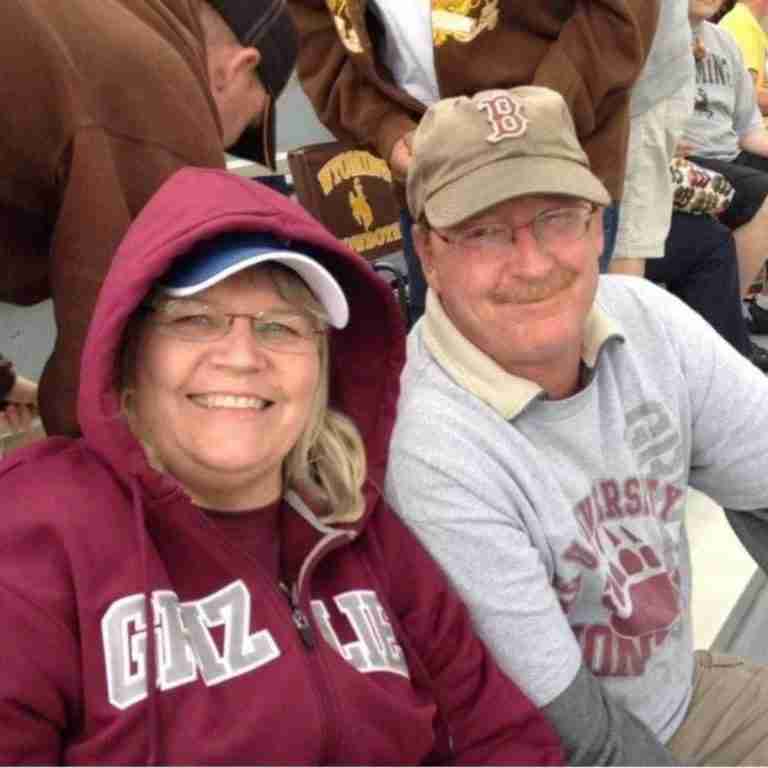
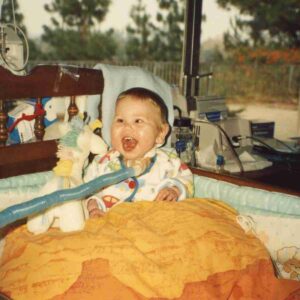



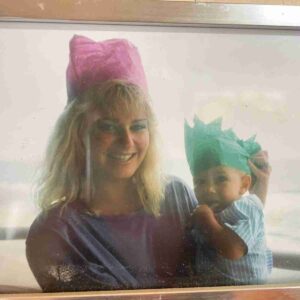


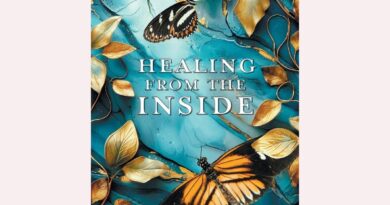
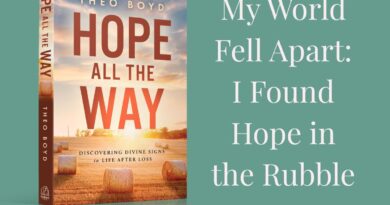













I feared so much we would lose Barb to her grief. We don’t all love the same way. It’s been very hard for her that some people cannot accept that she feels so much and is not “over it”. I just say I’m sorry and I’m here. I listen as best I can.
I am very glad we did not lose her. We don’t all love the same way, and we also do not all grieve the same way. Thanks for being someone willing to listen and understand. We all need people like that.
I put my favorite quote from our grief quotes article in another comment but I think it beautifully speaks to your point: “Death leaves a heartache no one can heal, love leaves a memory no one can steal.” — From an Irish headstone
Please take a moment to read some of the other inspirational content on the site, if you haven’t already.
My dear Barb, I knew very little of your life with Mike. I am glad I got to briefly meet him at our class reunion, because he is always a real person to me in a way that wouldn’t have happened otherwise. I liked him and hanging out a bit with both of you was a happy experience. I was really sorry to hear of his passing. Also, your story put into a kind of perspective that all grief has its own particular dimensions. The grief I feel for the loss of my mother and father and sister, is different from your ability to convey what it feels like to lose a spouse. It has been a difficult journey, I know. I am truly amazed at all you have accomplished in spite of it. You never let the sorrow suck you up. You’re still a wonderful mother grandmother, sister, friend, and artist, among other things. I sometimes feel the heavy steps you take moving ever forward under the heavy load of your loss. Thanks for sharing.
Grief is such a complicated thing. I am sorry for your losses as well. Thank you for leaving a comment.
Here is one of my favorite grief quotes: “Death leaves a heartache no one can heal, love leaves a memory no one can steal.” — From an Irish headstone
This story embodies everything about your journey with Mike and since (to infinity and beyond). So proud of you for sharing this part of yourself and honored to call you a friend.
We were also honored to be able to help her share her story. Thanks for leaving a comment.
I’m proud of you Barb, for sharing your story! I’m so glad we are friends! I’ve learned so much from you through your journey. ❤️
Love ya!
We are so grateful she chose to share her beautiful love story with us. Thanks for leaving a comment.
What a beautiful love story you two shared. I’m so sorry for your loss. Thank you for the courage to share the transparency of your journey.
Thank you, Meghan. It’s been such a journey that isn’t over.